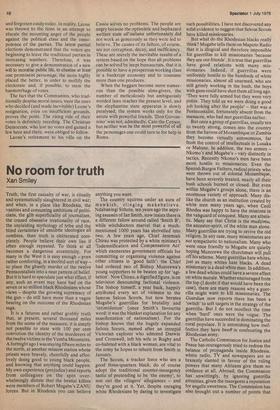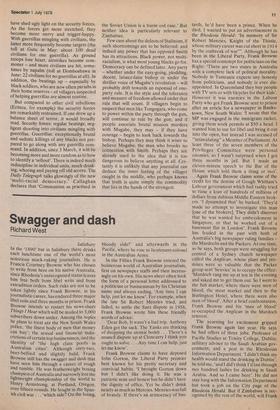No room for truth
Xan Smiley
Truth, the first casualty of war, is ritually and systematically slaughtered in civil war; and when, in a place like Rhodesia, the vanities and consuming ambitions of politicians, the glib superficiality of journalism, the crazed obsessiVe irrationality of race, the unyielding mythology of tribe and the blind certainties of unsubtle ideologies all combine, then truth is obliterated completely. People believe their own lies if often enough repeated. To think at all becomes a dangerous eccentricity. For many in the West it is easy enough — even rather comforting, in a morbid sort of way — to place the ghastly murder of the twelve Pentacostalists into a neat pattern of belief. But it is hard to speculate just what effect, if any, such an event may have had on the seven or so million black Rhodesians whose views — despite the growing supremacy of the gun — do still have more than a vague bearing on the outcome of the Rhodesian saga.
It is a fatuous and rather grubby truth that, at present, several thousand miles from the scene of the massacre, it is simply not possible to state with 100 per cent conviction the identity of the murderers of the twelve victims in the Vumba Mountains. A fortnight ago I was staying fifteen miles to the north, at another mission station whose priests were bravely, cheerfully and effectively doing good to young black people, and knowing that anything could happen. My own experience (prejudice) and reports from colleagues on the spot overwhelmingly dictate that the bestial killers were members of Robert Mugabe's ZAN U forces. But in Rhodesia you can believe•
anything you want.
The country squirms under an aura of mawkish, clinging makebelieve. Ndabaningi Sithole, ten years ago the aspiring assassin of Ian Smith, now insists there is a different fellow around called 'Smith B', while witchdoctors marvel that a muchmentioned 1000 years has shrivelled into two. A few years ago, Chief Jeremiah Chirau was protected by a white minister's 'Indemnification and Compensation Act' which exonerates government officials for committing or organising violence against other citizens in 'good faith': the Chief had ordered two of Bishop Muzorewa's young supporters to be beaten up for 'agitation'. Now Chirau, a dignified figure, is on television denouncing factional violence. The bishop himself, a year back, happily attributed every act of violence to the famous Selous Scouts, but now berates Mugabe's guerrillas for brutality and 'intimidation' (once Smith's favourite word: it was the blanket explanation for any manifestation of nationalism). For the bishop knows that the hugely expanded Selous Scouts, named after an intrepid Victorian explorer who admired Darwin and Cromwell, left his wife in Rugby and co-habited with a black woman, are vital to the army he hopes to inherit from Smith in January. The Scouts, a tracker force who are a good three-quarters black, do of course adopt the traditional counter-insurgency tactic of pretending to be 'the enemy', to test out the villagers' allegiances — and they're good at it. Yet, *despite enraging white Rhodesians by daring to investigate such possibilities, I have not discovered any solid evidence to suggest that Selous Scouts have killed missionaries.
But what do the Rhodesian blacks really think? Mugabe tells them on Maputo Radio that it is illogical and therefore impossible for guerrillas to kill missionaries `because they are our friends'. It is true that guerrillas have good relations with many mis sionaries. Indeed, if guerrillas were uniformly hostile to the hundreds of white missionaries, almost all unarmed, who are still grimly working in the bush, the boys with guns could have shot them all long ago.
'They were fully armed but they were very polite. They told us we were doing a good job looking after the people' — that was a Pentecostalist, fortunately absent from the massacre, who had met guerrillas earlier.
But once a group of guerrillas, usually ten to twenty strong, comes into the country from the havens of Mozambique or Zambia they become virtually autonomous, far from the control of intellectuals in Lusaka or Mabuto. In addition, the two armies — Nkomo's and Mugabe's — vary distinctly in tactics. Recently Nkonao's men have been more hostile to missionaries. Even the Spanish Burgos Fathers, radical 'priests who were thrown out of colonial Mozambique, have been severely treated, nearly all their bush schools burned or closed. But even within Mugabe's groups alone, there is an enormous variety of approach. Many dis like the church as an institution created by white men many years ago, when Cecil Rhodes was happy to have the missions in
the vanguard of conquest. Many are atheistic, Many say that Christ is the mudzimu,
the ancestor-spirit, of the white man alone.
Many guerrillas are trying to revive the old religion. In any case, many missionaries are
not sympathetic to nationalism. Many who
were once friendly to Mugabe are quietly hoping Muzorewa the churchman will pull off his scheme. Many guerrillas hate whites, just as many whites hate blacks. A dead missionary is a dead white man. In addition, a few dead whites could have a severe effect on white morale. Whether encouraged from the top (I doubt if that would have been the case), there are many reasons why a guer
rilla might want to kill missionaries. The Guardian now reports there has been a
'switch' to soft targets in the strategy of the guerrilla. But I do not recollect the time when 'hard' ones were the vogue. The guerrillas have succeeded in dominating the rural populace. It is astonishing how ineffective they have bee& in confronting the Rhodesian army.
The Catholic Commission for Justice and Peace has courageously tried to redress the balance of propaganda inside Rhodesia, where radio, TV and newspapers are so brazenly slanted in favour of the ruling powers that many Africans give them no credence at all. Abroad, the Commission has unwittingly, by ignoring guerrilla atrocities, given the insurgents a reputation for angelic sweetness. The Commission has also brought out a number of points that have shed ugly light on the security forces. As the forces get more stretched, they become more nervy and trigger-happy. With guerrillas mingling with civilians, the latter more frequently become targets (the toll at Gutu in May: about 100 dead civilians for one guerrilla). As ground troops lose heart, airstrikes become commoner — and more civilians are hit, sometimes by napalm (toll at Domboshawa in June: 22 civilians for no guerrillas at all). In addition, the beatings up — especially by black soldiers, who are now often pariahs in their home reserves—of villagers suspected of helping guerrillas are almost routine.
But compared to other civil rebellions (Eritrea, for example) the security forces are remarkably restrained. If one drew up a balance sheet of terror, it would broadly read. Security forces: regular beatings; negligent shooting into civilians mingling with guerrillas. Guerrillas: exceptionally brutal and sadistic killings of any blacks not prepared to go along with any guerrilla command. In addition, since 3 March, it will be becoming more and more random as to how to identify a 'sellout'. There is indeed much indiscipline in individual units, much drinking, whoring and paying off old scores. The Daily Telegraph talks glowingly of the new 'multi-racial democracy.' Callaghan declares that 'Communism as practised in
the Soviet Union is a burnt out case.' But neither idea is particularly relevant to Zimbabwe.
Few care about the defects of Stalinism, if such shortcomings are to be believed: and indeed any power that has opposed Smith has its attractions. Black power, not multi-' racialism, is what most young blacks go for. Democracy can be defined later. Any party — whether under the easy-going, plodding, decent, laissez-faire bishop or under the shriller voice of Mugabe's revolution — will probably drift towards an esponsal of oneparty rule. It is the style and the tolerance and measure of freedom allowed under that rule that will count. If villagers begin to suspect that men like Tongogara, who come to power within the party through the gun, will continue to rule by the gun; and if people associate brutal mission murders with Mugabe, they may — if they have courage — begin to look back towards the bishop. Perhaps they may think it wiser to believe Mugabe., the man who brooks no connection with Smith. Perhaps they are already used to the idea that it is too dangerous to believe anything at all. Certainly it is unlikely that any journalist can deduce the inner feeling of the villager caught in the middle, who perhaps knows that truth is quite simply the commodity that lies in the hands of the strongest.







































 Previous page
Previous page